30 june 2015
A holocaust in Syria, ethnic cleansing in Palestine…and the world still complains about terror!!!!!!
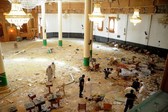
By Khalid Amayreh in occupied Palestine
The recent acts of terror in Kuwait, Tunisia and elsewhere must be condemned in the strongest terms. In the final analysis, killing innocent human beings, regardless of their race or creed, is totally unacceptable.
This is stated rather plainly and unequivocally in the Holy Quran, Islam's Holy Scriptures, in Suratul Maeda, verse 18:
“Because of that We ordained for the Children of Israel that if anyone killed a person not in retaliation of murder, or (and) to spread mischief in the land - it would be as if he killed all mankind, and if anyone saved a life…"
But condemnation alone is not enough.
We must understand the terror phenomenon objectively, irrespective of parochial political calculations. Otherwise, terror will continue to ruin nations and claim more and more innocent lives.
First of all, we must fully understand the motives and incentives that make the terrorists do what they do.
Moreover, we must never flinch from asking the "unpopular" and "politically incorrect" questions because otherwise we would continue to revolve in an empty circle.
In occupied Palestine, it took Israeli security experts many years to realize that the Nazi-like treatment meted out to innocent Palestinians was first and foremost responsible for the appearance of the so-called "suicide-bomber" phenomenon which many Palestinians and their supporters refer to as Martyrdom operations.
About two decades ago, the news anchorman of the Israeli state-run TV asked me how Palestinians would explain this suicide bomber phenomenon to the Israeli people.
I remember my answer sounded like this: "Israel is offering Palestinian youngsters either of two choices, death at the Jewish slaughterhouse, or blowing up their bodies into bits and pieces in the streets of Israeli towns. Many young Palestinians are going for the second choice".
The prominent journalist, who died several years ago, said initially that my answer was too shocking and too brazen for most Israeli Jews to digest but later readily acknowledged that what I said represented the "harsh truth" and contained elements of truth.
The Nazi-like treatment meted out to innocent Palestinians often defied linguistic description.
It included manifestly barbarian acts of pornographic violence targeting basically innocent people such as demolishing homes, throwing innocent occupants onto the street, murdering people, including children, without charge and trial and barring badly ill people from reaching hospitals.
In many respects, the repression was reminiscent of the repression experienced by European Jewry during the Nazi era.
Predictably, this dark evilness on the part of the Israeli political-military establishment drew an unexpected reaction, forcing many Palestinians, mostly in the prime of their lives, to turn themselves into human bombs.
Today, we are watching a similar phenomenon unfold in many parts of the world, especially in the Middle East.
Unfortunately, many politicians and commentators choose the easy but erroneous rationale to explain the terror phenomenon such as claiming that the terrorists do what they do because they have been indoctrinated to be violent. Others, especially those harboring an anti-Islamic agenda, unhesitatingly point an accusing finger toward Islam itself, although any cool and fair analysis of Islam will show that it is totally and absolutely innocent of all insinuations in this regard.
Consider this
Today, as hundreds of millions of Muslims around the world gather together each evening to break their day-long fast, they can't help being affronted with the phantasmagoric images of Muslim civilians being massacred en mass in Syria in full view of the world.
So far, as many as 250,000 Syrians have been killed at the hands of their sadistic regime of Bashar el-Asad which is openly backed and actively supported by Russia, Iran, Hizbullah and sectarian gangs from many parts of the world.
Just two days ago, a regime helicopter gunship dropped a huge barrel bomb on an Aleppo home where eight members of a local family were breaking their fast.
The entire family was annihilated.
This is not an isolated example. Crimes of this nature occur nearly every day as the world watches passively.
According to human rights observers, more than 30,000 people in Syria have been tortured to death at the hands of Nazi-like regime.
In fact, one would exaggerate little by comparing the regime of Bashar el-Assad to the worst criminal regimes in human history.
Now, doesn't the continuation of this thunderous genocide give the terrorists, e.g. IS a point? Doesn't it help them recruit thousands of additional frustrated youths to their cause? What would the leaders of US, UK, France and other western countries suggest these frustrated Muslim youngsters do under these circumstances? Pretend these genocidal atrocities are occurring in distant galaxies?
And Palestine…
The Palestinian plight has been going on since the creation of the criminal state of Israel in 1948. Since then Israel has been murdering, maiming and tormenting Palestinians nonstop in an effort to force them to leave their ancestral homeland.
Last year, Israel wantonly used its American-supplied death machine against the thoroughly starved and hermetically blockaded people of Gaza.
The Nazi-like blitz, which lasted for 51 days, destroyed as many as 100,000 homes and killed as many as 2100 Palestinians, the vast bulk of whom were innocent civilians, including more than 550 children.
The world, the so-called civilized world, contented with watching American-supplied war planes, such as F-15s and F-16s, drop one-ton bombs on multi-story apartment buildings packed with terrified men, women and children, transforming these buildings into rubble in a matter of seconds and exterminating every human being inside.
Interestingly, this pornographic crime against humanity occurred as world leaders and diplomats snidely urged "both sides to exercise restraint"? This was more than just adding insult to injury. It was complicity to a crime against humanity in broad daylight.
Now, doesn't this gigantic moral failure on the part of the world community give presumed terrorist groups a real justification for committing their own crimes for a hundred years to come?
Moderate Islamists who consistently rejected violence tried to walk in the democratic path in Algeria and recently in Egypt. But when they won elections, they were brutally massacred, tortured to death, ruthlessly repressed and eventually declared "terrorist groups."
Needless to say, this happened in full view of western democracies which instead of isolating and boycotting the murderous tyrannical regimes; effectively encouraged them to strangle every democratic voice and every expression of political freedom in their respective countries.
To be sure terror is not our destiny as Muslims.
However, we have to make a clear distinction between "cause" and "effect, "because in the final analysis we cannot eradicate the "effect" if we leave the "cause" intact.
Khalid Amayreh is a veteran Palestinian journalist and current affairs commentator living in the West Bank
The recent acts of terror in Kuwait, Tunisia and elsewhere must be condemned in the strongest terms. In the final analysis, killing innocent human beings, regardless of their race or creed, is totally unacceptable.
This is stated rather plainly and unequivocally in the Holy Quran, Islam's Holy Scriptures, in Suratul Maeda, verse 18:
“Because of that We ordained for the Children of Israel that if anyone killed a person not in retaliation of murder, or (and) to spread mischief in the land - it would be as if he killed all mankind, and if anyone saved a life…"
But condemnation alone is not enough.
We must understand the terror phenomenon objectively, irrespective of parochial political calculations. Otherwise, terror will continue to ruin nations and claim more and more innocent lives.
First of all, we must fully understand the motives and incentives that make the terrorists do what they do.
Moreover, we must never flinch from asking the "unpopular" and "politically incorrect" questions because otherwise we would continue to revolve in an empty circle.
In occupied Palestine, it took Israeli security experts many years to realize that the Nazi-like treatment meted out to innocent Palestinians was first and foremost responsible for the appearance of the so-called "suicide-bomber" phenomenon which many Palestinians and their supporters refer to as Martyrdom operations.
About two decades ago, the news anchorman of the Israeli state-run TV asked me how Palestinians would explain this suicide bomber phenomenon to the Israeli people.
I remember my answer sounded like this: "Israel is offering Palestinian youngsters either of two choices, death at the Jewish slaughterhouse, or blowing up their bodies into bits and pieces in the streets of Israeli towns. Many young Palestinians are going for the second choice".
The prominent journalist, who died several years ago, said initially that my answer was too shocking and too brazen for most Israeli Jews to digest but later readily acknowledged that what I said represented the "harsh truth" and contained elements of truth.
The Nazi-like treatment meted out to innocent Palestinians often defied linguistic description.
It included manifestly barbarian acts of pornographic violence targeting basically innocent people such as demolishing homes, throwing innocent occupants onto the street, murdering people, including children, without charge and trial and barring badly ill people from reaching hospitals.
In many respects, the repression was reminiscent of the repression experienced by European Jewry during the Nazi era.
Predictably, this dark evilness on the part of the Israeli political-military establishment drew an unexpected reaction, forcing many Palestinians, mostly in the prime of their lives, to turn themselves into human bombs.
Today, we are watching a similar phenomenon unfold in many parts of the world, especially in the Middle East.
Unfortunately, many politicians and commentators choose the easy but erroneous rationale to explain the terror phenomenon such as claiming that the terrorists do what they do because they have been indoctrinated to be violent. Others, especially those harboring an anti-Islamic agenda, unhesitatingly point an accusing finger toward Islam itself, although any cool and fair analysis of Islam will show that it is totally and absolutely innocent of all insinuations in this regard.
Consider this
Today, as hundreds of millions of Muslims around the world gather together each evening to break their day-long fast, they can't help being affronted with the phantasmagoric images of Muslim civilians being massacred en mass in Syria in full view of the world.
So far, as many as 250,000 Syrians have been killed at the hands of their sadistic regime of Bashar el-Asad which is openly backed and actively supported by Russia, Iran, Hizbullah and sectarian gangs from many parts of the world.
Just two days ago, a regime helicopter gunship dropped a huge barrel bomb on an Aleppo home where eight members of a local family were breaking their fast.
The entire family was annihilated.
This is not an isolated example. Crimes of this nature occur nearly every day as the world watches passively.
According to human rights observers, more than 30,000 people in Syria have been tortured to death at the hands of Nazi-like regime.
In fact, one would exaggerate little by comparing the regime of Bashar el-Assad to the worst criminal regimes in human history.
Now, doesn't the continuation of this thunderous genocide give the terrorists, e.g. IS a point? Doesn't it help them recruit thousands of additional frustrated youths to their cause? What would the leaders of US, UK, France and other western countries suggest these frustrated Muslim youngsters do under these circumstances? Pretend these genocidal atrocities are occurring in distant galaxies?
And Palestine…
The Palestinian plight has been going on since the creation of the criminal state of Israel in 1948. Since then Israel has been murdering, maiming and tormenting Palestinians nonstop in an effort to force them to leave their ancestral homeland.
Last year, Israel wantonly used its American-supplied death machine against the thoroughly starved and hermetically blockaded people of Gaza.
The Nazi-like blitz, which lasted for 51 days, destroyed as many as 100,000 homes and killed as many as 2100 Palestinians, the vast bulk of whom were innocent civilians, including more than 550 children.
The world, the so-called civilized world, contented with watching American-supplied war planes, such as F-15s and F-16s, drop one-ton bombs on multi-story apartment buildings packed with terrified men, women and children, transforming these buildings into rubble in a matter of seconds and exterminating every human being inside.
Interestingly, this pornographic crime against humanity occurred as world leaders and diplomats snidely urged "both sides to exercise restraint"? This was more than just adding insult to injury. It was complicity to a crime against humanity in broad daylight.
Now, doesn't this gigantic moral failure on the part of the world community give presumed terrorist groups a real justification for committing their own crimes for a hundred years to come?
Moderate Islamists who consistently rejected violence tried to walk in the democratic path in Algeria and recently in Egypt. But when they won elections, they were brutally massacred, tortured to death, ruthlessly repressed and eventually declared "terrorist groups."
Needless to say, this happened in full view of western democracies which instead of isolating and boycotting the murderous tyrannical regimes; effectively encouraged them to strangle every democratic voice and every expression of political freedom in their respective countries.
To be sure terror is not our destiny as Muslims.
However, we have to make a clear distinction between "cause" and "effect, "because in the final analysis we cannot eradicate the "effect" if we leave the "cause" intact.
Khalid Amayreh is a veteran Palestinian journalist and current affairs commentator living in the West Bank
29 june 2015

Today UNRWA announced that 85 per cent of all 137 international personnel on short term contracts will be separated in a phased process which will last until the end of September.
35 per cent of the 137 internationals will see their contracts end in the coming four weeks. Another 50 per cent will end by 30 September without further extension or renewal. UNRWA is taking this measure to reduce costs as much as possible without reducing services to refugees.
UNRWA has a deficit to the end of the year of 101 million USD and we will continue with our robust efforts in resource mobilisation.
As things currently stand, with stringent austerity measures already in place beyond today’s announcement, the Agency should be able to continue with life-saving services to the end of the year. These include our health programmes, relief and social services, sanitation and emergency projects for which we have funds.
UNRWA’s school system for half a million children across the Middle East in Jordan, Lebanon, the occupied Palestinian territory and Syria are essential but some difficult decisions may be needed in coming weeks if the deficit is not filled.
christopher gunness | spokesperson, director of advocacy and strategic communications
unrwa | office of the commissioner general | jerusalem
t: +972 2 589 0267 | m: +972 54 240 2659 | f: +972 2 589 0240
e: [email protected] | skype: chrisrobertgunness l Twitter: @ChrisGunness
UNRWA to lay off 85% of international staff
United Nations Relief and Works Agency for Palestinian Refugees (UNRWA) in Gaza announced its decision to lay off 137 international short-term employees who make 85% of its international staff.
In a statement Monday, UNRWA clarified that the lay-off of international workers will be done on stages. 35% of the contracts will be finished in the coming four weeks while the rest will be ended by the end of next September without being renewed or extended.
The UN agency said that this procedure aims at minimizing costs at the possible maximum rates without diminishing the services offered for Palestinian Refugees. It pointed out that it has been suffering from budget deficit by the end of the year estimated at $101 million.
UNRWA said it will continue its efforts for bringing in financial funds to guarantee continuation of offering services at the current level. It underlined that it will only be able to offer services of “Saving Lives” project just until the end of 2015. The project involves services such as health sector, relief, social services, sewage and emergency.
It also pointed out that there might be a need to make difficult decisions in the coming weeks, in case of failure to cover the deficit, in terms of UNRWA schooling system in the Middle East, particularly, in Jordan, Lebanon, Palestinian territories and Syria.
35 per cent of the 137 internationals will see their contracts end in the coming four weeks. Another 50 per cent will end by 30 September without further extension or renewal. UNRWA is taking this measure to reduce costs as much as possible without reducing services to refugees.
UNRWA has a deficit to the end of the year of 101 million USD and we will continue with our robust efforts in resource mobilisation.
As things currently stand, with stringent austerity measures already in place beyond today’s announcement, the Agency should be able to continue with life-saving services to the end of the year. These include our health programmes, relief and social services, sanitation and emergency projects for which we have funds.
UNRWA’s school system for half a million children across the Middle East in Jordan, Lebanon, the occupied Palestinian territory and Syria are essential but some difficult decisions may be needed in coming weeks if the deficit is not filled.
christopher gunness | spokesperson, director of advocacy and strategic communications
unrwa | office of the commissioner general | jerusalem
t: +972 2 589 0267 | m: +972 54 240 2659 | f: +972 2 589 0240
e: [email protected] | skype: chrisrobertgunness l Twitter: @ChrisGunness
UNRWA to lay off 85% of international staff
United Nations Relief and Works Agency for Palestinian Refugees (UNRWA) in Gaza announced its decision to lay off 137 international short-term employees who make 85% of its international staff.
In a statement Monday, UNRWA clarified that the lay-off of international workers will be done on stages. 35% of the contracts will be finished in the coming four weeks while the rest will be ended by the end of next September without being renewed or extended.
The UN agency said that this procedure aims at minimizing costs at the possible maximum rates without diminishing the services offered for Palestinian Refugees. It pointed out that it has been suffering from budget deficit by the end of the year estimated at $101 million.
UNRWA said it will continue its efforts for bringing in financial funds to guarantee continuation of offering services at the current level. It underlined that it will only be able to offer services of “Saving Lives” project just until the end of 2015. The project involves services such as health sector, relief, social services, sewage and emergency.
It also pointed out that there might be a need to make difficult decisions in the coming weeks, in case of failure to cover the deficit, in terms of UNRWA schooling system in the Middle East, particularly, in Jordan, Lebanon, Palestinian territories and Syria.
26 june 2015
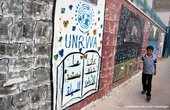
The UN Relief and Works Agency for Palestine Refugees (UNRWA) announced on Thursday that it will apply the Early Voluntary Retirement initiative, which allows employees who meet the requirements to volunteer to leave the service of the agency before reaching retirement age.
This initiative is part of a series of measures aimed at reducing internal costs. At the same time it guarantees the provision of good service to Palestine refugees. UNRWA confirmed its full commitment to provide its main services for the time being, although the available funding is only enough until September.
The financial crisis currently plaguing the agency is the worst in its 65-year history. It is currently suffering from a $101 million deficit in its main budget, which provides basic services including education, relief, social services and health for the estimated five million Palestine refugees who are registered with UNRWA in Gaza, the West Bank, Lebanon, Syria and Jordan.
This initiative is part of a series of measures aimed at reducing internal costs. At the same time it guarantees the provision of good service to Palestine refugees. UNRWA confirmed its full commitment to provide its main services for the time being, although the available funding is only enough until September.
The financial crisis currently plaguing the agency is the worst in its 65-year history. It is currently suffering from a $101 million deficit in its main budget, which provides basic services including education, relief, social services and health for the estimated five million Palestine refugees who are registered with UNRWA in Gaza, the West Bank, Lebanon, Syria and Jordan.
21 june 2015

At least 2,889 Palestinian refugees were killed in war-torn Syria; some 896 Palestinians have been locked up in Syrian regime jails, while 276 others have gone missing, the Action Group for Palestinians in Syria reported Sunday.
The Action Group said in a report issued to mark the World Refugee Day that 1,009 Palestinian refugees were killed in strikes targeting their homes; some 618 refugees were killed in clashes while 397 others were tortured to death in Syrian regime jails.
277 Palestinian refugees were shot dead by sniper bullets; 177 Palestinians died as a result of the tough blockade imposed by Syrian regime forces, the report added.
Other refugees breathed their last in various circumstances, including field executions, blasts, and abductions.
The group further documented the incarceration of 896 Palestinian refugees in Syrian regime lock ups.
The report also sounded the alarm over the tough siege imposed around the necks of Palestinian refugees for the 723rd day running at the Yarmouk camp, also rocked by long-term power and water cuts.
The Action Group said in a report issued to mark the World Refugee Day that 1,009 Palestinian refugees were killed in strikes targeting their homes; some 618 refugees were killed in clashes while 397 others were tortured to death in Syrian regime jails.
277 Palestinian refugees were shot dead by sniper bullets; 177 Palestinians died as a result of the tough blockade imposed by Syrian regime forces, the report added.
Other refugees breathed their last in various circumstances, including field executions, blasts, and abductions.
The group further documented the incarceration of 896 Palestinian refugees in Syrian regime lock ups.
The report also sounded the alarm over the tough siege imposed around the necks of Palestinian refugees for the 723rd day running at the Yarmouk camp, also rocked by long-term power and water cuts.
19 june 2015
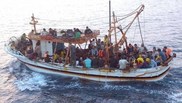
36,450 Palestinian refugees fleeing war-torn Syria reached Europe between 2011 and June 2015, Action Group for Palestinian refugees in Syria said in a report issued Friday.
In 2011, 2,465 Palestinian refugees reached Europe after managing to leave their refugee camps in Syria, while 3,513 arrived to the European territories in 2012.
9,620 others reached Europe in 2013, while 13,902 refugees managed to travel in 2014. During the first half of 2015, 6,950 Palestinian refugees arrived to Europe.
The 36,450 refugees arrived to Europe via the so-called "boats of death" risking their lives after being forced to flee their homes in Syria and to live again uncertain lives as refugees, the report said.
Big numbers of Palestinian refugees forcibly left their refugee camps fleeing from the ongoing bloody events in Syria.
In 2011, 2,465 Palestinian refugees reached Europe after managing to leave their refugee camps in Syria, while 3,513 arrived to the European territories in 2012.
9,620 others reached Europe in 2013, while 13,902 refugees managed to travel in 2014. During the first half of 2015, 6,950 Palestinian refugees arrived to Europe.
The 36,450 refugees arrived to Europe via the so-called "boats of death" risking their lives after being forced to flee their homes in Syria and to live again uncertain lives as refugees, the report said.
Big numbers of Palestinian refugees forcibly left their refugee camps fleeing from the ongoing bloody events in Syria.
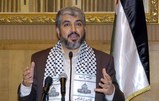
Head of Hamas's political bureau Khaled Mishaal has strongly denounced the armed clashes that took place on the first day of the holy month of Ramadan in Ain al-Hilweh refugee camp, south of Lebanon.
Mishaal condemned the events which he described as "unfortunate" during a phone call with Hamas representative in Lebanon Ali Baraka.
The Hamas political leader called upon the Palestinians in Lebanon to close ranks and address internal differences through dialog.
He stressed his Movement's keenness on maintaining peace and security in Lebanon and the Palestinian refugee camps, and promoting the Palestinian-Lebanese relations.
Two Palestinians were killed and at least 11 others wounded when a personal dispute escalated into violent clashes between two militias, one of them affiliated with Fatah, in the south Lebanon refugee camp of Ain al-Hilweh Thursday.
Mishaal condemned the events which he described as "unfortunate" during a phone call with Hamas representative in Lebanon Ali Baraka.
The Hamas political leader called upon the Palestinians in Lebanon to close ranks and address internal differences through dialog.
He stressed his Movement's keenness on maintaining peace and security in Lebanon and the Palestinian refugee camps, and promoting the Palestinian-Lebanese relations.
Two Palestinians were killed and at least 11 others wounded when a personal dispute escalated into violent clashes between two militias, one of them affiliated with Fatah, in the south Lebanon refugee camp of Ain al-Hilweh Thursday.
18 june 2015
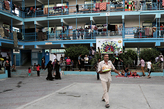
Relief agency gives money to families made homeless by last summer's conflict for temporary accommodations; reconstruction of homes yet to begin.
The UN has closed the last remaining shelter for Palestinians displaced in last summer's war in Gaza, a spokesman said Thursday, with families seeking temporary accommodation elsewhere.
The July-August conflict between Israel and Islamist movement Hamas, which rules the Gaza Strip, left 100,000 Gazans homeless and forced many to seek refuge in schools belonging to the UN's Palestinian refugee agency, UNRWA. "Some 30 families left the shelter of the Bahrain school (in western Gaza City), where up to 1,100 displaced people had been living," UNRWA spokesman Adnan Abu Hasna told AFP.
It was the final UN building being used as a shelter for those displaced in the war, he said.
The United Nations has stressed the need for its schools being used as shelters to be able to function fully as educational institutions. UNRWA gave between $800 and $1000 (700-875 euros) to each family to be spent on temporary accommodation for several months, Abu Hasna said. He said that the amount of money the agency could continue giving families would "depend on donor support."
Reconstruction of the tens of thousands of homes destroyed during the war has not yet begun, although repairs have been made to a number of partially damaged buildings, UNRWA says. Gazans who lost their homes are either staying with relatives, in temporary accommodation such as apartments, or living under makeshift canvas tents in the ruins of their bombed-out houses.
At the height of the conflict, some 300,000 displaced Palestinians were sheltering in some 91 UN schools, several of which were hit by Israeli strikes.
Israel maintains it needed to target those facilities because Palestinian militants were using the areas to store weapons and fire rockets.
The UN has closed the last remaining shelter for Palestinians displaced in last summer's war in Gaza, a spokesman said Thursday, with families seeking temporary accommodation elsewhere.
The July-August conflict between Israel and Islamist movement Hamas, which rules the Gaza Strip, left 100,000 Gazans homeless and forced many to seek refuge in schools belonging to the UN's Palestinian refugee agency, UNRWA. "Some 30 families left the shelter of the Bahrain school (in western Gaza City), where up to 1,100 displaced people had been living," UNRWA spokesman Adnan Abu Hasna told AFP.
It was the final UN building being used as a shelter for those displaced in the war, he said.
The United Nations has stressed the need for its schools being used as shelters to be able to function fully as educational institutions. UNRWA gave between $800 and $1000 (700-875 euros) to each family to be spent on temporary accommodation for several months, Abu Hasna said. He said that the amount of money the agency could continue giving families would "depend on donor support."
Reconstruction of the tens of thousands of homes destroyed during the war has not yet begun, although repairs have been made to a number of partially damaged buildings, UNRWA says. Gazans who lost their homes are either staying with relatives, in temporary accommodation such as apartments, or living under makeshift canvas tents in the ruins of their bombed-out houses.
At the height of the conflict, some 300,000 displaced Palestinians were sheltering in some 91 UN schools, several of which were hit by Israeli strikes.
Israel maintains it needed to target those facilities because Palestinian militants were using the areas to store weapons and fire rockets.
17 june 2015
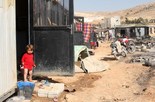
"The isolation, exclusion and dispossession of Palestine refugees in Syria, Gaza, the West Bank, Jordan and Lebanon represent a time-bomb for the Middle East region", according to Pierre Krähenbühl, Commissioner-General of the United Nations Relief and Works Agency.
Speaking at a meeting of UNRWA's Advisory Commission of major donors and host governments in Amman, Krähenbühl said more than five million Palestine refugees today "face an existential crisis on many fronts" which he said was "a denial of dignity and rights that must be addressed".
He drew attention to the plight of refugees across the region saying that they are approaching 50 years of occupation.
The Commissioner-General called for urgent and concerted action to address the underlying political causes of this situation, adding that the human consequences of inaction were growing exponentially.
Krähenbühl also pointed out that his Agency was facing its most serious financial crisis ever. "Currently, UNRWA confronts a funding shortfall for core activities -- such as schools for half a million children -- to cover the year 2015 of USD101 million. UNRWA at present could pay salaries and cover activities only into September," he said.
On UNRWA's emergency funding, he pointed out that the Agency was in a dire situation. Funding for UNRWA's Syria appeal for 2015 stands at only 27%. As a result the Agency has had to scale back the frequency and amount of cash assistance that is distributed to refugees in Syria in situations of extreme vulnerability. In Lebanon, Palestine refugees from Syria are not receiving assistance towards housing, gravely affecting families without the means to secure shelter. UNRWA's Gaza reconstruction appeal for USD720 million has received approximately USD216 million in pledges.
With unprecedented needs faced by the Palestine refugees, contributions are falling far short of demand, and Krähenbühl said UNRWA would have to implement serious austerity measures.
He insisted that these measures were aimed at reducing costs while preserving core services.
Taking into account concerns expressed by refugees, staff and host governments, Krähenbühl confirmed that services in health, sanitation and relief and social services would be guaranteed in 2015. He underlined the urgency of mobilizing all the necessary support to close the funding gap to ensure continued education services.
UNRWA will organize a special consultation with host governments within ten days to exchange further views on this critical situation. The Advisory Commission expressed a collective will to support UNRWA and look for solutions to the present challenges.
Krähenbühl conveyed UNRWA’s absolute determination to live up to its mandate and provide the services, support and respect that Palestine refugees should receive.
Speaking at a meeting of UNRWA's Advisory Commission of major donors and host governments in Amman, Krähenbühl said more than five million Palestine refugees today "face an existential crisis on many fronts" which he said was "a denial of dignity and rights that must be addressed".
He drew attention to the plight of refugees across the region saying that they are approaching 50 years of occupation.
The Commissioner-General called for urgent and concerted action to address the underlying political causes of this situation, adding that the human consequences of inaction were growing exponentially.
Krähenbühl also pointed out that his Agency was facing its most serious financial crisis ever. "Currently, UNRWA confronts a funding shortfall for core activities -- such as schools for half a million children -- to cover the year 2015 of USD101 million. UNRWA at present could pay salaries and cover activities only into September," he said.
On UNRWA's emergency funding, he pointed out that the Agency was in a dire situation. Funding for UNRWA's Syria appeal for 2015 stands at only 27%. As a result the Agency has had to scale back the frequency and amount of cash assistance that is distributed to refugees in Syria in situations of extreme vulnerability. In Lebanon, Palestine refugees from Syria are not receiving assistance towards housing, gravely affecting families without the means to secure shelter. UNRWA's Gaza reconstruction appeal for USD720 million has received approximately USD216 million in pledges.
With unprecedented needs faced by the Palestine refugees, contributions are falling far short of demand, and Krähenbühl said UNRWA would have to implement serious austerity measures.
He insisted that these measures were aimed at reducing costs while preserving core services.
Taking into account concerns expressed by refugees, staff and host governments, Krähenbühl confirmed that services in health, sanitation and relief and social services would be guaranteed in 2015. He underlined the urgency of mobilizing all the necessary support to close the funding gap to ensure continued education services.
UNRWA will organize a special consultation with host governments within ten days to exchange further views on this critical situation. The Advisory Commission expressed a collective will to support UNRWA and look for solutions to the present challenges.
Krähenbühl conveyed UNRWA’s absolute determination to live up to its mandate and provide the services, support and respect that Palestine refugees should receive.
